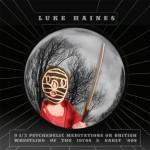
Luke Haines 9 1/2 Psychedelic Meditations on British Wrestling of the 1970s and Early '80s
(Fantastic Plastic)
It would be fair to say that a concept album about the heyday of British wrestling is going to have a rather select audience; it's doubtful that many people under thirty will have any idea of who its cast of characters are, or indeed any interest in finding out. But then, going by Luke Haines' curmudgeonly reputation, and status as the perennial dark-horse/prince of Britpop, he probably likes it that way.
In fact, this isn't the first time that Haines has appropriated the sport for his music – Black Box Recorder's debut came with an image of 'exotic' wrestler Adrian Street on the cover and his 2006 album Off My Rocker at the Art School Bop referenced faux-Japanese wrestler Kendo Nagasaki. Considering how obsessed Haines is with capturing images of a bygone Britain the subject matter seems like a perfect fit – by falling out of favour so hard, and so fast (technically yes, matches are still going on in the same venues up and down the country, but the sport never really got over the demise of ITV's World of Sport in 1985, going from a genuine cultural phenomenon to minority interest in less than three years; the most rapid case of the ever-fickle British public losing interest in something this side of The Ting Tings), it serves as an excellent tool with which to capture an era, as if the mid 70's-80's had been pickled in a jar and put on display. What's more even just a cursory look into the back-story throws up a wealth of ludicrous stories and even more ludicrous characters, and, surprisingly (although it does make perfect sense if you think about it) more than a few links to the music industry.
Not that Haines, one of music's great self-flagellators, and conversely one of its great self-mythologists, goes for the obvious route. The expected cast of characters might make an appearance, and he does devote a number to the bizarre yet also quite sweet relationship between Street and his manager/occasional tag-team partner/future wife 'Miss Linda', but he passes up the opportunity to cover some of the scene's more dramatic, ridiculous and even tragic moments, and while there is a through-narrative here, just about, which places the events around the ceremonial unmasking of Nagasaki in '77, it's not one that makes a lot of sense. Haines has said that his motivation for writing the album was his father's recent illness and how this caused him to reflect on childhood memories of watching the sport, and if your response to that is thinking that that seems oddly sincere and heartfelt for the pricklish Haines then you'd be right: the secretive, depressed and even slightly kinky characters that inhabit 9 1/2 Psychedelic Meditations on British Wrestling of the 1970s and Early '80s are hardly the stuff of fond nostalgia.
They are good for more than a few laughs though. Big Daddy Got a Casio VL-Tone is the most unexpected reworking of Kraftwerk's Pocket Calculator you're ever likely to hear, and it was already a fairly daft song to start with, and he cops some of the style of Chris Morris' disturbing ambient comedy Blue Jam on the titular half-track What the Plumber Saw. He's slightly less successful at capturing the loneliness of the long-distance-driving wrestler though; there are some blinding lyrics about a life spent on the road that, in terms of quality, are a million miles away from the generic tour-induced breakdown material that most musicians feel entitled to trot out once they've hit a certain level of success, but generally his tone is too arch for things like the elegy of Haystacks in Heaven (Parts 1-3) to work as intended. Like pretty much every Luke Haines record, the feeling that album really aims for, and hits bang on target, is the barely concealed despair of a weekend spent in the suburbs of England; Saturday Afternoon, with its sinister recollections of children's TV series Catweazle, and even more sinister delivery of the lines “'Mother, what's for tea?'/'Liver sausage sandwich and cheese'”, is a brilliant but oddly difficult listen. Although the similarly themed monologue on We are Unusual Men is less successful as it sees Haines get dangerously close to telling us that it used to be all fields round here when he was a lad, and that kids these days don't even know they're born.
In several cases the wrestling aspect seems a bit arbitrary, as if Haines has just appropriated the names for his own characters (or perhaps it's just because wrestlers are in fact surprisingly versatile cultural icons, as the semiologist Roland Barthes pointed out). In fact, the title's pretty inaccurate as there's nothing particularly psychedelic about the album; it exists more in the world of Rita, Sue and Bob Too than Lovely Rita or Bob Dylan with its commitment to sticking to the everyday grind of the distinctly unglamourous era, and in its general unwillingness to move beyond the voice and gentle strum of an acoustic guitar set-up.
9 1/2 Psychedelic Meditations on British Wrestling of the 1970s and Early '80s is, other than a long title, a quintessentially Luke Haines record, it's just not one of his best. In particular, it could have done with him tightening up the narrative a bit, as one suspects that even those who remember the scene from their youth will struggle to keep up with the dark flights of fancy contained within, and perhaps it would have worked better if it hadn't been delivered entirely in his trademark sneer. Although, even if it is a minor work, Haines is one of the most distinct singer songwriters working today and probably couldn't be boring if he tried. And, as an added bonus, it might also explain a lot about the mindset of the nation's thirty-to-forty-something menfolk.
15 November, 2011 - 09:17 — Mark Davison